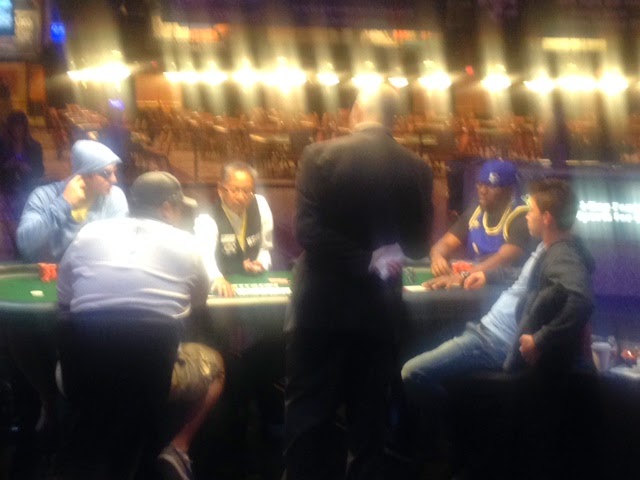For Unabomber fans, the WSOP $5,000 Pot-Limit Omaha Six Handed tournament finishes in anticlimactic fashion––the always exciting-to-watch Phil Laak goes out in sixth, leaving five relatively tight players to duke it out. Surprisingly, action continues apace, with the short stacked Kory Kilpatrick driving most of the creative post flop play.
Laak in happier times, vs. Studdard
Eliminated in fifth is Brant Hale, who picks a hell of a way to go. Holding A-Q-9-8, he raises 115,000 and is called by Darius Studdard. The flop comes down with a nut diamond draw for Hale 6-5-3, but he holds three diamonds ––significantly weakening his chances of hitting pay dirt. Studdard, holding 10-9-7-5 has a baby flush draw to go with his made straight. Both players check the flop and when Steddard bets out 250,000 on a four of spades turn, Hale comes over the top all-in for his last million chips. I am completely flabbergasted at this move––Hale not only has three of the suit he is after, but he is up against a large raise by a tight and steady player clearly repping a made straight. Hale has to know that he is getting his still healthy stack in as a 4-1 dog against an almost certain call. Studdard, surprisingly, tanks on his decision––perhaps trying to figure out how a gift horse could hit him so squarely in the mouth––before making the inevitable call and climbing to nearly 3 million chips.
Hale makes an ill-timed "semi something" shove against Studdard on a wing and a prayer
...and reads the bad news.
The uber-cautious Ryan Schmidt is the next to go, risking his last half million chips against Studdard with A-K-9-2 on a K-10-7 flop. Unfortunately, Studdard has a ton of draws with A-Q-J-7 and completes the straight with a nine on the river.
Schmidt (hand to chin) –– uber-cautious
Despite his considerable stack and sudden chip lead, Studdard does not quite dominate three-handed play. His inexperience in late-stage PLO tournament play is demonstrated in a hand where Studdard raises preflop with A-A-7-4 preflop and is called by PLO tournament specialist Kory Kilpatrick, who sits on a short stack of 600,000. When the flop comes Q-7-5, Kilpatrick shoves his last 410,000 chips and Studdard inexplicably folds his overpair. This is a situation in which Kilpatrick could easily have a lone queen, a second pair, or a draw. (As it turns out, he had the same second pair seven as Studdard, without the aces to go with it). What Kilpatrick does apparently have is fold equity––although the fold is inexplicable given Kilpatrick’s wide range. Studdard should have been doing what Kilpatrick did––bombing away with his second pair in a heads-up situation where only a small percentage of his chips would be at risk.
Kilpatrick––bombing away with second pair
There is another key hand in which Studdard correctly folds on the river when a flush hits for Michael Drummond. Despite the correct river read, the fact that he lost a big pot was avoidable––he held the near nuts on the turn and could have gotten his opponent off the flush draw with a larger turn raise that put Drummond’s tournament life at stake. Failure to execute in these two critical situations probably lost Studdard the tournament. That said, this cautious approach was optimal earlier, in that it got him to the final table when more active players were falling right and left.
Drummond and Kilpatrick ––sizing each other up
Interestingly, I am watching the WSOP.com hole cards coverage on a 30-minute delay in the stands when Studdard and his friends actually requisition my computer to examine the hand described above in between action at the table. I mentioned to Studdard what I think of his earlier nit fold with pocket aces and he takes that into consideration as well, clearly now aware of his opponents wider-than-expected calling and shoving ranges.
Studdard (left) sprinting back to the felt after checking WSOP.com coverage on my laptop. Glad to be of service.
Kory Kilpatrick is next to go when his A-K-Q-4 runs up against Michael Drummond’s K-K-J-4. With Kilpatrick hitting his ace on the flop, Drummond somehow back doors his way into a straight and sends the impressive Kilpatrick to the rail with $217,000. Studdard now has 1.5 million chips against Drummond’s monster 5 million chip stack and is quickly dispatched when his dominating Q-10-3-3 goes up against Drummond’s 8-7-4-4. The 8-3-4 flop hits both players hard, with trip fours prevailing against trip threes––as they usually do. Taking first place in his first WSOP event of the season, the steady Michael Drummond earns a whopping $541,000. This historic heads-up match is also notable as the first to feature two contenders wearing jerseys of my hometown Golden State Warriors.
Steady, low-key Drummond ––ultimately victorious









No comments:
Post a Comment